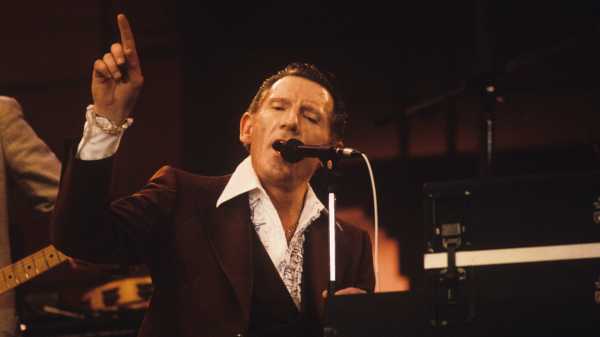
Jerry Lee Lewis, the foundational rock-and-roll pianist, singer, and songwriter, was always true to his nickname, the Killer. Whether he was onstage, in the recording studio, or pumping out a radio commercial for McDonald’s, a brand as much a part of the landscape of the fifties as Lewis’s voice, he was a performer of alarming abandon, thrilling audiences for well over half a century. And yet his reputation will always be sullied. Celebrities are imperfect in countless ways, but not many marry their thirteen-year-old cousins.
Lewis, who died at the age of eighty-seven, on Friday, was the last survivor of the generation that included Chuck Berry, Elvis Presley, and Little Richard. Raised in a Pentecostal Christian family in Ferriday, Louisiana, he always knew he was playing the devil’s music. He revelled in it. Presley had a superior voice, and Berry and Little Richard came up with nearly every distinctive instrumental lick of the era. But Lewis had it all. He could write or, like Elvis, create the definitive version of someone else’s lyric. He sang with hellacious force and conviction. He played the piano in a way that was both melodic and percussive. Above all, Lewis put on one hell of a show. Long before the Who shattered their instruments or Jimi Hendrix played guitar with his teeth, Lewis was playing the piano keys with his heel or elbow in time to the music. The pace of his shows accelerated like a car running downhill without brakes. Even in his waning years, he drove audiences to the sorts of abandon that concert-hall operators and insurance adjusters always feared.
Lewis was competitive with his generational rivals. Early in his career, he was annoyed that Berry was awarded the closing spot during a series of concerts they were headlining. One night, the story goes, Lewis pulled out a Coke bottle filled with gasoline and poured it on his piano. He set the instrument ablaze and kept on playing “Great Balls of Fire.” When he was done, he walked off the stage and taunted Berry: “Top that!” he said, adding a vile slur.
In the late fifties, while Elvis was abroad and in the Army, Lewis was poised for dominance, but he undermined himself badly when reporters discovered he had married his underage cousin, Myra Gale Brown, while still married to another woman. In a typically clueless explanation, he told a reporter for the Wall Street Journal many years later, “I probably would have rearranged my life a little bit different, but I never did hide anything from people.”
The business and music worlds wanted it both ways with Jerry Lee Lewis: they craved his unmistakable talent but wanted to keep their distance. In a recording studio for McDonald’s, in 1982, he played “Great Balls of Fire,” but sang lines like “Goodness, gracious, Big Mac and fries,” and “some cool thick shakin’ going on.” As he vamped at the end of the jingle, he exhorted listeners, “Tell ’em the Killer sent you.” Cathy Altman, the copywriter who had written the new lyrics for the ad, admitted that her agency didn’t want the public to know this was really Jerry Lee; they just wanted people to think it sounded like him. “If you think of rock and roll, you think of one living person,” Altman said: “Jerry Lee Lewis. We wanted this to sound right, to feel right.” And then she added, memorably, “The client doesn’t want this too identified with him. I mean, drinking, drugs, child abuse . . .” The spot never aired.
Lewis was open about his struggles with alcohol and drugs. And he was given to volatile behavior, including drunkenly demanding entry to Graceland armed with .38-calibre Derringer. He explained his many marriages (six) as a matter of artistic necessity: “I had a guy tell me once, a songwriter, that the only way he could write another good song was to go out and get him a new wife or a new girlfriend and make his life miserable.”
What really irked Lewis was the non-reaction to Elvis’s similar behavior. “I don’t want to sound disrespectful to the dead,” he said, “but fuck Elvis.” In Lewis’s analysis of the situation, he had been condemned even though nobody seemed to mind that Elvis had started dating Priscilla Ann Beaulieu, in Germany, when she, too, was underage. When someone mentioned that Priscilla had been fourteen, and not Elvis’s cousin, Lewis grew angry. “Stop right there,” he said. “He was not married to her. I was married, because I was an honest, God-fearing man.” ♦
Sourse: newyorker.com






